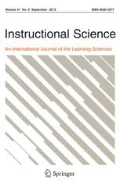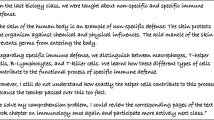Abstract
This article presents two longitudinal studies that investigated expertise reversal effects in journal writing. In Experiment 1, students wrote regular journal entries over a whole term. The experimental group received a combination of cognitive and metacognitive prompts. The control group received no prompts. In the first half of the term, the experimental group applied more cognitive and metacognitive strategies in their journals and showed higher learning outcomes than the control group. Towards the end of the term, the amount of cognitive and metacognitive strategies elicited by the experimental group decreased while the number of cognitive strategies applied by the control group increased. Accordingly, the experimental group lost its superiority on learning outcomes. In order to avoid these negative long-term effects of prompts, a gradual and adaptive fading-out of the prompts was introduced in the experimental group in Experiment 2 while a control group received permanent prompts. The results showed that, over the course of the term, the fading group applied increasingly more cognitive strategies while the control group applied fewer and fewer cognitive strategies. Accordingly, at the end of the term, the permanent prompts group showed substantially lower learning outcomes than the fading group. Together, these results provide evidence for an expertise reversal effect in writing-to-learn. The more the students became skilled in journal writing and internalized the desired strategies, the more the external guidance by prompts became a redundant stimulus that interfered with the students’ internal tendency to apply the strategies and, thus, induced extraneous cognitive load. Accordingly, a gradual fading-out of the prompts in line with the learners’ growing competencies proved to be effective in mitigating the negative side-effects of the provided instructional support.





Similar content being viewed by others
References
Baddeley, A. D. (1986). Working memory. New York: Oxford University Press.
Barnett, J. E., DiVesta, F. J., & Rogozinski, J. T. (1981). What is learned in note taking? Journal of Educational Psychology, 73, 181–192.
Berthold, K., Nückles, M., & Renkl, A. (2007). Do learning protocols support learning strategies and outcomes? The role of cognitive and metacognitive prompts. Learning and Instruction, 17, 564–577.
Biggs, J. B., & Collis, K. F. (1982). Evaluating the quality of learning: The SOLO taxonomy. New York: Academic Press.
Brown, A. L. (1978). Knowing when and how to remember: A problem of metecognition. In R. Glaser (Ed.), Advances in instructional psychology (Vol. 1, pp. 225–253). Hillsdale, NJ: Erlbaum.
Cantrell, R. J., Fusaro, J. A., & Dougherty, E. A. (2000). Exploring the effectiveness of journal writing on learning social studies: A comparative study. Reading Psychology, 21, 1–11.
Chi, M. T. H., Bassok, M., Lewis, M. W., Reimann, P., & Glaser, R. (1989). Self-explanations: How students study and use examples in learning to solve problems. Cognitive Science, 13, 145–182.
Cohen, J. (1988). Statistical power analysis for the behavioral sciences (2nd ed.). Hillsdale, NJ: Erlbaum.
Collins, A. (2006). Cognitive apprenticeship. In R. K. Sawyer (Ed.), The Cambridge handbook of the learning sciences (pp. 47–60). Cambridge: Cambridge University Press.
Collins, A., Brown, J. S., & Newman, S. E. (1989). Cognitive apprenticeship: Teaching the crafts of reading writing, and mathematics. In L. B. Resnick (Ed.), Knowing, learning, and instruction (pp. 453–494). Hillsdale, NJ: Erlbaum.
Connor-Greene, P. A. (2000). Making connections: Evaluating the effectiveness of journal writing in enhancing student learning. Teaching of Psychology, 27, 44–46.
Cowan, N. (2001). The magical number 4 in short-term memory: A reconsideration of mental storage capacity. Behavioral and Brain Sciences, 24, 87–114.
Deci, E. L., Eghari, H., Patrick, B. C., & Leone, D. R. (1994). Facilitating internalization: The self-determination theory perspective. Journal of Personality, 62, 119–142.
Deci, E. L., Koestner, R., & Ryan, R. M. (1999). A meta-analytic review of experiments examining the effects of extrinsic rewards on intrinsic motivation. Psychological Bulletin, 125, 627–668.
Dillenbourg, P., & Jerman, P. (2007). Designing integrative scripts. In F. Fischer, I. Kollar, H. Mandl, & J. M. Haake (Eds.), Scripting computer-supported collaborative learning. Cognitive, computational and educational perspectives (pp. 259–289). Berlin: Springer.
Efklides, A., & Vauras, M. (Eds.). (1999). Metacognitive experiences in their role in cognition (special issue). European Journal of Psychology of Education, 14, 455–584.
Flavell, J. H. (1976). Metacognitive aspects of problem solving. In L. B. Resnick (Ed.), The nature of intelligence (pp. 231–235). Hillsdale, NJ: Lawrence Erlbaum.
Flavell, J. H. (1978). Metacognitive development. In J. M. Scandura & C. J. Brainerd (Eds.), Structural/process theories of complex human behaviour (pp. 213–245). Alphen aan den Rijn, The Netherlands: Sijthoff and Noordhoff.
Hübner, S., Nückles, M., & Renkl, A. (2009). Writing learning journals: Instructional support to overcome learning-strategy deficits. Learning and Instruction. doi:10.1016/j.learninstruc.2008.12.001.
Kalyuga, S. (2005). Prior knowledge principle. In R. Mayer (Ed.), Cambridge handbook of multimedia learning (pp. 325–337). New York: Cambridge University Press.
Kalyuga, S. (2007). Expertise reversal effect and its implications for learner-tailored instruction. Educational Psychology Review, 19, 509–539.
Kalyuga, S., Ayres, P., Chandler, P., & Sweller, J. (2003). The expertise reversal effect. Educational Psychologist, 38, 23–31.
King, A. (1992). Comparison of self-questioning, summarizing, and note-taking-review as strategies for learning from lectures. American Educational Research Journal, 29, 303–323.
Mayer, R. E. (1984). Aids to text comprehension. Educational Psychologist, 19, 30–42.
Mayer, R. E. (2002). The promise of educational psychology: Vol. 2. Teaching for meaningful learning. Upper Saddle River, NJ: Prentice Hall.
McCrindle, A., & Christensen, C. (1995). The impact of learning journals on metacognitive and cognitive processes and learning performances. Learning and Instruction, 5, 167–185.
McNeill, K. L., Lizotte, D. J., Krajcik, J., & Marx, R. W. (2006). Supporting students’ construction of scientific explanations by fading scaffolds in instructional materials. Journal of the Learning Sciences, 15, 153–191.
Nückles, M., Hübner, S., & Renkl, A. (2009). Enhancing self-regulated learning by writing learning protocols. Learning and Instruction, 19, 259–271.
Nückles, M., Schwonke, R., Berthold, K., & Renkl, A. (2004). The use of public learning diaries in blended learning. Journal of Educational Media, 29, 49–66.
Paris, S. G., Lipson, M. Y., & Wixson, K. K. (1983). Becoming a strategic reader. Contemporary Educational Psychology, 8, 293–316.
Pressley, M., Wood, E., Woloshyn, V. E., Martin, V., King, A., & Menke, D. (1992). Encouraging mindful use of prior knowledge: Attempting to construct explanatory answers facilitates learning. Educational Psychologist, 27, 91–109.
Puntambekar, S., & Hübscher, R. (2005). Tools for scaffolding students in a complex learning environment: What have we gained and what have we missed? Educational Psychologist, 40, 1–12.
Reigeluth, C. M., & Stein, F. S. (1983). The elaboration theory of instruction. In C. M. Reigeluth (Ed.), Instructional-design theories and models: An overview of their current status (pp. 335–382). Hillsdale, NJ: Lawrence Erlbaum Associates.
Renkl, A. (1999). Learning mathematics from worked-out examples: Analyzing and fostering self-explanations. European Journal of Psychology of Education, 14, 477–488.
Ryan, R. M., & Deci, E. L. (2000). Self-determination theory and the facilitation of intrinsic motivation, social development, and well-being. American Psychologist, 55, 68–78.
Schraw, G. (1998). Promoting general metacognitive awareness. Instructional Science, 26, 113–125.
Schwonke, R., Hauser, S., Nückles, M., & Renkl, A. (2006). Enhancing computer-supported writing of learning protocols by adaptive prompts. Computers in Human Behavior, 22, 77–92.
Sweller, J. (2005). Implications of cognitive load theory for multimedia learning. In R. Mayer (Ed.), Cambridge handbook of multimedia learning (pp. 19–30). New York: Cambridge University Press.
Sweller, J., van Merriënboer, J. G., & Paas, F. G. (1998). Cognitive architecture and instructional design. Educational Psychology Review, 10, 251–296.
Weinberger, A., Reiserer, M., Ertl, B., Fischer, F., & Mandl, H. (2005). Facilitating collaborative knowledge construction in computer-mediated learning environments with cooperation scripts. In R. Bromme, F. W. Hesse, & H. Spada (Eds.), Barriers, biases and opportunities of communication and cooperation with computers (pp. 15–37). New York: Springer.
Weinstein, C. E., & Mayer, R. E. (1986). The teaching of learning strategies. In C. M. Wittrock (Ed.), Handbook of research in teaching (pp. 315–327). New York: Macmillan Publishing Company.
Zohar, A., & Peled, B. (2008). The effects of explicit teaching of metastrategic knowledge on low- and high-achieving students. Learning and Instruction, 18, 337–353.
Acknowledgments
This research was supported by the Deutsche Forschungsgemeinschaft (DFG; [German Research Foundation]) with a project grant awarded to Matthias Nückles (contract NU 129/2-1). We would like to thank Bettina Brockhaus and Julian Roelle for their assistance in coding the learning journals.
Author information
Authors and Affiliations
Corresponding author
Rights and permissions
About this article
Cite this article
Nückles, M., Hübner, S., Dümer, S. et al. Expertise reversal effects in writing-to-learn. Instr Sci 38, 237–258 (2010). https://doi.org/10.1007/s11251-009-9106-9
Received:
Accepted:
Published:
Issue Date:
DOI: https://doi.org/10.1007/s11251-009-9106-9




